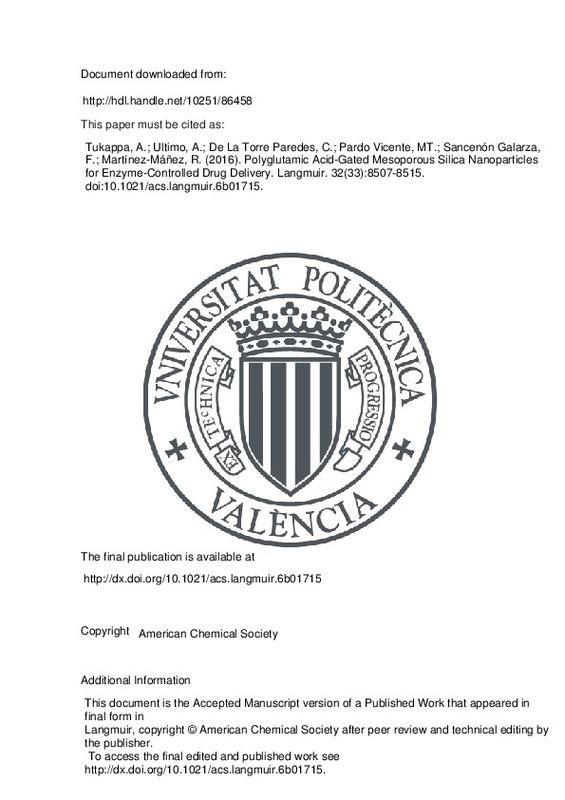JavaScript is disabled for your browser. Some features of this site may not work without it.
Buscar en RiuNet
Listar
Mi cuenta
Estadísticas
Ayuda RiuNet
Admin. UPV
Polyglutamic Acid-Gated Mesoporous Silica Nanoparticles for Enzyme-Controlled Drug Delivery
Mostrar el registro sencillo del ítem
Ficheros en el ítem
| dc.contributor.author | Tukappa, Asha
|
es_ES |
| dc.contributor.author | Ultimo, Amelia
|
es_ES |
| dc.contributor.author | De la Torre Paredes, Cristina
|
es_ES |
| dc.contributor.author | Pardo Vicente, María Teresa
|
es_ES |
| dc.contributor.author | Sancenón Galarza, Félix
|
es_ES |
| dc.contributor.author | Martínez-Máñez, Ramón
|
es_ES |
| dc.date.accessioned | 2017-09-05T14:17:31Z | |
| dc.date.issued | 2016-08-23 | |
| dc.identifier.issn | 0743-7463 | |
| dc.identifier.uri | http://hdl.handle.net/10251/86458 | |
| dc.description | This document is the Accepted Manuscript version of a Published Work that appeared in final form in Langmuir, copyright © American Chemical Society after peer review and technical editing by the publisher. To access the final edited and published work see http://dx.doi.org/10.1021/acs.langmuir.6b01715. | es_ES |
| dc.description.abstract | Mesoporous silica nanoparticles (MSNs) are highly attractive as supports in the design of controlled delivery systems that can act as containers for the encapsulation of therapeutic agents, overcoming common issues such as poor water solubility and poor stability of some drugs and also enhancing their bioavailability. In this context, we describe herein the development of polyglutamic acid (PGA)-capped MSNs that can selectively deliver rhodamine B and doxorubicin. PGA-capped MSNs remain closed in an aqueous environment, yet they are able to deliver the cargo in the presence of pronase because of the hydrolysis of the peptide bonds in PGA. The prepared solids released less than 20% of the cargo in 1 day in water, whereas they were able to reach 90% of the maximum release of the entrapped guest in ca. 5 h in the presence of pronase. Studies of the PGA-capped nanoparticles with SK-BR-3 breast cancer cells were also undertaken. Rhodamine-loaded nanoparticles were not toxic, whereas doxorubicin-loaded nanoparticles were able to efficiently kill more than 90% of the cancer cells at a concentration of 100 μg/mL. | es_ES |
| dc.description.sponsorship | A.T. wishes to express her gratitude to the Erasmus mundus (Svagata.eu) financial support. A.U. and C. de la T. are grateful to the Spanish Ministry of Education, Culture and Sport for her doctoral fellowship. We thank the Spanish Government (Project MAT2015-64139-C4-1-R, MINECO/FEDER) and Generalitat Valenciana (Project PROMETEOII/2014/047) for their support. The authors also thank UPV electron microscopy services for the technical support. | en_EN |
| dc.language | Inglés | es_ES |
| dc.publisher | American Chemical Society | es_ES |
| dc.relation.ispartof | Langmuir | es_ES |
| dc.rights | Reserva de todos los derechos | es_ES |
| dc.subject | Operated mechanized nanoparticles | es_ES |
| dc.subject | Metastatic breast-cancer | es_ES |
| dc.subject | Controlled-release | es_ES |
| dc.subject | Guest molecules | es_ES |
| dc.subject | Targeted delivery | es_ES |
| dc.subject | Soluble drugs | es_ES |
| dc.subject | DNA | es_ES |
| dc.subject | Systems | es_ES |
| dc.subject | Nanomedicine | es_ES |
| dc.subject | Supports | es_ES |
| dc.subject | Electron Microscopy Service of the UPV | es_ES |
| dc.subject.classification | QUIMICA INORGANICA | es_ES |
| dc.subject.classification | QUIMICA ANALITICA | es_ES |
| dc.subject.classification | QUIMICA ORGANICA | es_ES |
| dc.title | Polyglutamic Acid-Gated Mesoporous Silica Nanoparticles for Enzyme-Controlled Drug Delivery | es_ES |
| dc.type | Artículo | es_ES |
| dc.embargo.lift | 10000-01-01 | |
| dc.embargo.terms | forever | es_ES |
| dc.identifier.doi | 10.1021/acs.langmuir.6b01715 | |
| dc.relation.projectID | info:eu-repo/grantAgreement/MINECO//MAT2015-64139-C4-1-R/ES/NANOMATERIALES INTELIGENTES, SONDAS Y DISPOSITIVOS PARA EL DESARROLLO INTEGRADO DE NUEVAS HERRAMIENTAS APLICADAS AL CAMPO BIOMEDICO/ | es_ES |
| dc.relation.projectID | info:eu-repo/grantAgreement/GVA//PROMETEOII%2F2014%2F047/ES/Nuevas aproximaciones para el diseño de materiales de liberación controlada y la detección de compuestos peligrosos/ | es_ES |
| dc.rights.accessRights | Abierto | es_ES |
| dc.contributor.affiliation | Universitat Politècnica de València. Departamento de Química - Departament de Química | es_ES |
| dc.description.bibliographicCitation | Tukappa, A.; Ultimo, A.; De La Torre Paredes, C.; Pardo Vicente, MT.; Sancenón Galarza, F.; Martínez-Máñez, R. (2016). Polyglutamic Acid-Gated Mesoporous Silica Nanoparticles for Enzyme-Controlled Drug Delivery. Langmuir. 32(33):8507-8515. https://doi.org/10.1021/acs.langmuir.6b01715 | es_ES |
| dc.description.accrualMethod | S | es_ES |
| dc.relation.publisherversion | http://dx.doi.org/10.1021/acs.langmuir.6b01715 | es_ES |
| dc.description.upvformatpinicio | 8507 | es_ES |
| dc.description.upvformatpfin | 8515 | es_ES |
| dc.type.version | info:eu-repo/semantics/publishedVersion | es_ES |
| dc.description.volume | 32 | es_ES |
| dc.description.issue | 33 | es_ES |
| dc.relation.senia | 318271 | es_ES |
| dc.contributor.funder | Ministerio de Economía y Competitividad | es_ES |
| dc.contributor.funder | European Commission | es_ES |
| dc.contributor.funder | Generalitat Valenciana | es_ES |
| dc.contributor.funder | Ministerio de Educación, Cultura y Deporte | es_ES |







![[Cerrado]](/themes/UPV/images/candado.png)

